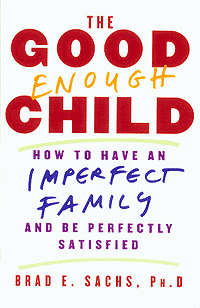
INTRODUCTION
Over the years, I've heard the innermost feelings of thousands of parents--not just through conversations with my patients, but by sharing experiences with my friends and family, and with the many people who have read my books and articles or attended my workshops and lectures. Some of them are expectant or brand-new parents, some are experienced parents with grade-school, adolescent or young adult children. But whether they are old hands at the job or just beginning, and whether they're birth parents, step-parents, or adoptive parents, all of them face problems and all of them seem to be seeking the same solution in one form or another: perfection.
What will ultimately give parents real satisfaction in their family lives, however, is not the Perfect Child, but the Good Enough Child. Seeing your child as Good Enough does not mean feeling hopeless and defeated, "settling" for the child you've got while yearning for the imaginary child that forever eludes your grasp. Raising and loving a Good Enough Child is something different, the process of adopting the radical, wondrous, and liberating belief that your child is already terrific, and sustaining that belief no matter what twists and turns your family journey follows.
The Good Enough Child is a child who does not feel that he has to be a different child or a better child to be loved, cherished and supported. The Good Enough Child has his share of problems, frailties, and imperfections, but he is much more likely to mature and blossom anyway because he is secure in the knowledge of his parents' capacity to accept him for who he is, even if his problems, frailties, and imperfections never completely disappear.
When the Good Enough Child's behaviors suggest that he has some learning or growing to do, these behaviors are not ignored or indulged, but instead honestly acknowledged at the same time as his many talents and attributes are warmly celebrated. This enables him both to more effectively address his weaknesses as well as to capitalize on his strengths.
The Good Enough Child experiences a deep sense of appreciation, not so much for what he does, but for who he is, and is free to become the person he feels destined to become, even if this requires a courageous departure from the paths that his parents have so eagerly prepared for him. The Good Enough Child revels in his parents' deep and profound pleasure in the miracle of his mere presence, and carries internally wherever he goes a sense of purpose, wonder and joy that is not contingent on external criteria.
Most importantly, the Good Enough Child, through seeing himself mirrored in his parents' loving and compassionate eyes, grows up to become an adult who can give and receive love with his own friends, his own partner, and, eventually, with his own Good Enough Child.
In THE GOOD ENOUGH CHILD, I show you how it is possible to raise children without harsh judgment or unrealistic expectations, and with the capacity to handle your own and your children's flaws and virtues, failures and successes, in a spirit of acceptance and unwavering love.
You will learn to translate the bewildering, infuriating, disappointing and disillusioning behaviors that children display, to understand that all such behaviors are a request for love, and to respond with sensitivity and generosity rather than with rage and irritability at these difficult times.
You will discover how to listen to your children rather than talk at them, how to instruct them with kindness rather than criticize them with contempt, how you can even grow from, rather than suffer through, the slings and arrows of outrageous offspring, and in the process become a more fulfilling, and fulfilled, individual, the architect of a richer personal and family life.
The elemental irony and mystery of childrearing is that children are most likely to grow and change for the better only when they can trust that they'll be loved even if they stay the same. When you work wholeheartedly on accepting the imperfections of your children, you are cultivating the most crucial and fundamental component of parenting, the "art" from which all other parental arts body forth. It is this art that I teach-for it is learnable--in THE GOOD ENOUGH CHILD.
